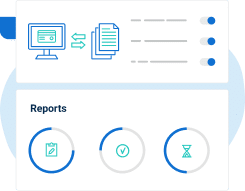I noticed that many people running ISO 27001 projects who have downloaded documentation templates think “I have the templates now – the rest is easy. I’ll write a few documents, show them to auditor, and it’ll be over in a few days”.
Unfortunately, it’s not that easy. Here’s why:
1. Writing the documentation requires time and effort
You shouldn’t write the documents just for the auditor to read them – you should write them because you want to define some rules for your organization.
But if you want your documentation to be useful, you have to adapt it to the realistic needs of your company. It probably doesn’t make sense to create a rule to change passwords every month, but it might make sense to change it every 3 or every 6 months – so you have to find out what is appropriate for your level or risks and for your organization.
Further, some documents are rather complex, and require certain knowledge to write them – for example, to perform the risk assessment first you need to write the Risk assessment methodology. If such a methodology is not suited for your organization, your employees doing the risk assessment may end up spending an enormous amount of time, to eventually realize that you could have done it in a much quicker and more efficient way. On the other hand, you may choose to take shortcuts, and by doing so omit some of the requirements of ISO 27001 with the result of failure at the certification.
So you need to invest time and effort in your education, and in the analysis of your company.
2. Documentation without implementation is nothing
Once you finish writing, you realize the documentation doesn’t make any sense if those rules are not really applied in your organization. In other words, having perfect documents alone isn’t going to raise your level of security.
But the problem is – if you want to implement new rules, you have to change habits in your organization. And changing habits isn’t easy, especially if it means restricting the freedom that employees enjoyed until now (and this is what security rules usually do). Taking again the example of password policy – if no such rule existed before and suddenly you ask your employees to change passwords every 3 months, they certainly won’t be happy. Moreover, they will look for ways to avoid such a rule.
So, besides making sure this rules makes sense from a security point of view, you have to explain to your employees why it is necessary, and in case of some more complex rules you will have to explain how to do it. These are called awareness and training programs, without which you will have high chances that your employees will simply reject such a change. And these programs also require time and effort.
3. Maintenance is often neglected
Most of the companies that have completed the documentation and implemented all the rules and processes, start forgetting about the documentation – new issues keep occurring that change how things are done, but that fact is not reflected in documentation. As a consequence, more and more people notice that documents are not useable anymore, and this in turn results in less and less people adhering to them.
This happens if no one is in charge of documentation maintenance – good practice says that for each document an ‘owner’ should be designated, a person who is responsible for keeping it up-to-date. But again – this requires time and effort.
Therefore, purchasing your documentation templates is not the end of your information security journey – it is just the beginning.
To become compliant easily and efficiently, use Advisera’s Documentation Toolkits that provide all required documentation and step-by-step guidance.

 Dejan Kosutic
Dejan Kosutic 


